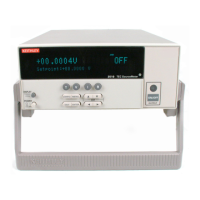Models 2510 and 2510-AT User’s Manual Remote Operations 6-15
Leading colon
The leading colon is not necessary, and not using the leading colon will slightly increase
response times. Example:
:FORM:ELEM = FORM:ELEM
NOTE The “*” for common commands is always required.
Long-form and short-form versions
A SCPI command word can be sent in its long-form or short-form version. The command
subsystem tables in Section 10 provide the long-form version. However, the short-form
version is indicated by upper case characters. Examples:
:SYSTem:PRESet long-form
:SYST:PRES short-form
:SYSTem:PRES long-form and short-form combination
Note that each command word must be in long-form or short-form, and not something in
between. For example, :SYSTe:PRESe is illegal and will generate an error. The command
will not be executed.
Short-form rules
Use the following rules to determine the short-form version of any SCPI command:
• If the length of the command word is four letters or less, no short form version
exists. Example:
:auto = :auto
These rules apply to command words that exceed four letters:
• If the fourth letter of the command word is a vowel (including “y”), delete it and all
the letters after it. Example
:immediate = :imm
• If the fourth letter of the command word is a consonant, retain it but drop all the
letters after it. Example:
:display = :disp
• If the command contains a question mark (?; query) or a non-optional number
included in the command word, you must include it in the short-form version.
Examples:
:current? = :curr?
:window2 = :wind2
:window[1] = :wind
• Command words or characters that are enclosed in brackets ([ ]) are optional and
need not be included in the program message.
NOTE For fastest response to commands, always use short forms.

